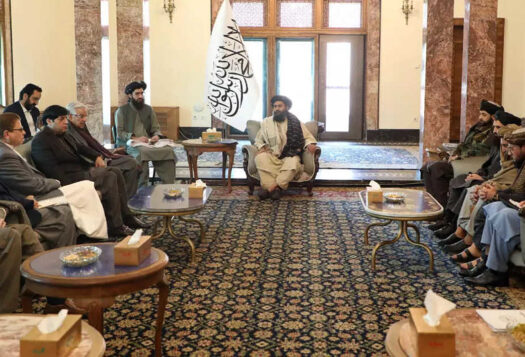
Iranian President Hassan Rouhani concluded a two-day visit to Pakistan a few weeks ago, meeting with top civilian and military leadership to improve bilateral relations and strengthen economic ties. His visit was crucial considering Pakistan has yet to make use of the relaxed sanctions on Iran. The visit was also being watched closely in Saudi Arabia since Islamabad has attempted to play a proactive role in easing recent tensions between Tehran and Riyadh. Though deepening economic integration with Iran is beneficial for Pakistan, relations with Saudi Arabia and stability in the Middle East are geopolitically important. President Rouhani’s visit was yet another piece of Islamabad’s balancing act between Riyadh and Tehran.
Rouhani’s visit to Pakistan was his first as the Iranian president and comes as a result of an invitation by Prime Minister Sharif. During the visit, matters of mutual interest such as border security, terrorism, and trans-border crimes like drugs and human trafficking were discussed. The leadership of both countries signed six memoranda of understanding (MoUs) addressing multiple fields including health, commerce, finance, and foreign services. However, the most significant was an agreement on the Five-Year Strategic Trade Cooperation Plan. Under this plan, both states agreed to enhance bilateral trade volume up to $5 billion from the existing $270 million in the next five years. In addition, the five year plan includes negotiations on Iran-Pakistan Free Trade Agreement, removal of non-tariff barriers, reactivation of the joint business council, and establishment of border markets, among other initiatives.
Prime Minister Sharif also mentioned that the two sides decided to open two more border crossing points to boost trade and facilitate people-to-people contact. The possibility of sea trade through Pakistan’s Gwadar Port and Iran’s Chahbahar Port was also explored. A senior Iranian official announced that a Pakistani delegation would visit in regards to a natural gas deal, which had previously been a casualty of international sanctions against Iran. Thus, Pakistan-Iran commercial engagement seems to be on the upswing.
However, Islamabad is acutely aware of its domestic sensitivity to trouble in the Middles East. Thus, Pakistan has been trying to develop a modus vivendi between Iran and Saudi Arabia to avoid sectarian confrontation at home. Sectarian polarization and political instability in the region could lead to serious security and economic repercussions for Pakistan through sharpening of social cleavages in the country—Pakistan has a history of sectarian violence rooted in the Sunni/Shia split dividing the Middle East. Thus, the Pakistani leadership has been actively engaged in attempting to defuse tensions in the region. Maintaining good relations with both Riyadh and Tehran is very much related to keeping peace in the Muslim Ummah, since Pakistan is aware that an armed conflict between the two countries could destabilize the region and beyond.
Pakistan’s decision to reshape its Middle East foreign policy towards neutrality has faced difficult challenges. Pakistan refused to participate in the Saudi-led operation against Houthi rebels in Yemen. A special joint session of Parliament unanimously passed a resolution declaring that the country would remain “neutral” in the Yemen conflict. Still, the Parliament reiterated support for Riyadh and affirmed that in case of threat to holy places, Pakistan would stand “shoulder to shoulder” with Saudi Arabia and its people. The much-needed visit of Prime Minister Nawaz Sharif and Chief of Army Staff Raheel Sharif to Riyadh and Tehran in January was commended by both domestic and foreign stakeholders. Pakistan’s willingness to host a meeting between Saudi Arabia and Iran, and its proposal to appoint a focal person to address the Iran/Saudi conflict are also encouraging signs.
Islamabad needs to continue this balanced policy towards the two major Middle Eastern powers. Building and maintaining friendly relations with Muslim states and discouraging confrontation should be the cornerstone of Pakistan’s foreign policy going forward. Peace and harmony in the Middle East can lead to peace and harmony in the entire Muslim world. Hence, Pakistan should follow its policy of delicate neutrality and make hay while the Western sun shines on Iran.
***
Image: Anadolu Agency, Getty


